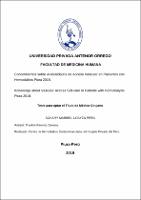| dc.contributor.advisor | Ramírez Zamora, Franklin | |
| dc.contributor.author | Loayza Peña, Schary Maribel | |
| dc.creator | Loayza Peña, Schary Maribel | |
| dc.date.accessioned | 2019-03-22T08:12:13Z | |
| dc.date.available | 2019-03-22T08:12:13Z | |
| dc.date.issued | 2019 | |
| dc.identifier.uri | https://hdl.handle.net/20.500.12759/4597 | |
| dc.description.abstract | El trabajo de investigación tiene como objetivo determinar el nivel de conocimientos sobre autocuidados de acceso vascular en pacientes con hemodiálisis.MATERIAL Y MÉTODOS.Estudiodescriptivo, observacional, prospectivo, de fuente primaria, de corte transversal; dicha información se obtuvo mediante una ficha de recolección de datos con previa autorización del participante.La población estudiada fue el total de pacientes del servicio de Nefrología en Hemodiálisis del Hospital Privado del Perú-Piura durante el periodo Enero-Agosto 2018. Los datos fueron procesados en hoja Excel y programa SPSS versión 23. RESULTADOS Entre quienes refirieron contar con estudios superiores, ninguno mostró conocimientos altos sobre autocuidado de acceso vascular, el 27.27% mostró conocimientos intermedios y el 72.73% tuvo conocimientos bajos sobre el autocuidado de su acceso vascular. No existe diferencia estadísticamente significativa en el nivel de conocimientos sobre autocuidado de acceso vascular en pacientes sometidos a hemodiálisis, tengan o no tengan nivel de educación superior. | es_PE |
| dc.description.abstract | The objective of this research is to determine the level of knowledge about vascular access self-care in patients with hemodialysis. MATERIAL AND METHODS. descriptive, observational, prospective, primary source, cross- sectional study; the information was obtained through questionnaire with authorization of the participant. The population studied was the total number of patients in the Hemodialysis Service of the Private Hospital of Peru-Piura during the period January-August 2018. The data were processed in Excel spreadsheet and SPSS version 23 program. RESULTS Among those who reported having higher education, none showed high knowledge about self-care of vascular access, 27.27% showed intermediate knowledge and 72.73% had low knowledge about the self-care of their vascular access. There is no statistically significant | en_US |
| dc.description.uri | Tesis | es_PE |
| dc.format | application/pdf | es_PE |
| dc.language.iso | spa | es_PE |
| dc.publisher | Universidad Privada Antenor Orrego | es_PE |
| dc.relation.ispartofseries | T_MEDP_078 | |
| dc.rights | info:eu-repo/semantics/openAccess | es_PE |
| dc.rights.uri | https://creativecommons.org/licenses/by/4.0/ | es_PE |
| dc.source | Universidad Privada Antenor Orrego | es_PE |
| dc.source | Repositorio Institucional - UPAO | es_PE |
| dc.subject | Acceso vascular | es_PE |
| dc.subject | Autocuidado | es_PE |
| dc.subject | Hemodiálisis | es_PE |
| dc.title | Conocimientos sobre autocuidados de acceso vascular en pacientes con hemodiálisis Piura 2018 | es_PE |
| dc.type | info:eu-repo/semantics/bachelorThesis | es_PE |
| thesis.degree.level | Título Profesional | es_PE |
| thesis.degree.grantor | Universidad Privada Antenor Orrego. Facultad de Medicina Humana | es_PE |
| thesis.degree.name | Médico Cirujano | es_PE |
| thesis.degree.discipline | Medicina Humana | es_PE |
| dc.subject.ocde | https://purl.org/pe-repo/ocde/ford#3.02.27 | es_PE |
| renati.type | https://purl.org/pe-repo/renati/type#tesis | es_PE |
| renati.level | https://purl.org/pe-repo/renati/level#tituloProfesional | es_PE |
| renati.discipline | 912016 | es_PE |
| dc.publisher.country | PE | es_PE |


